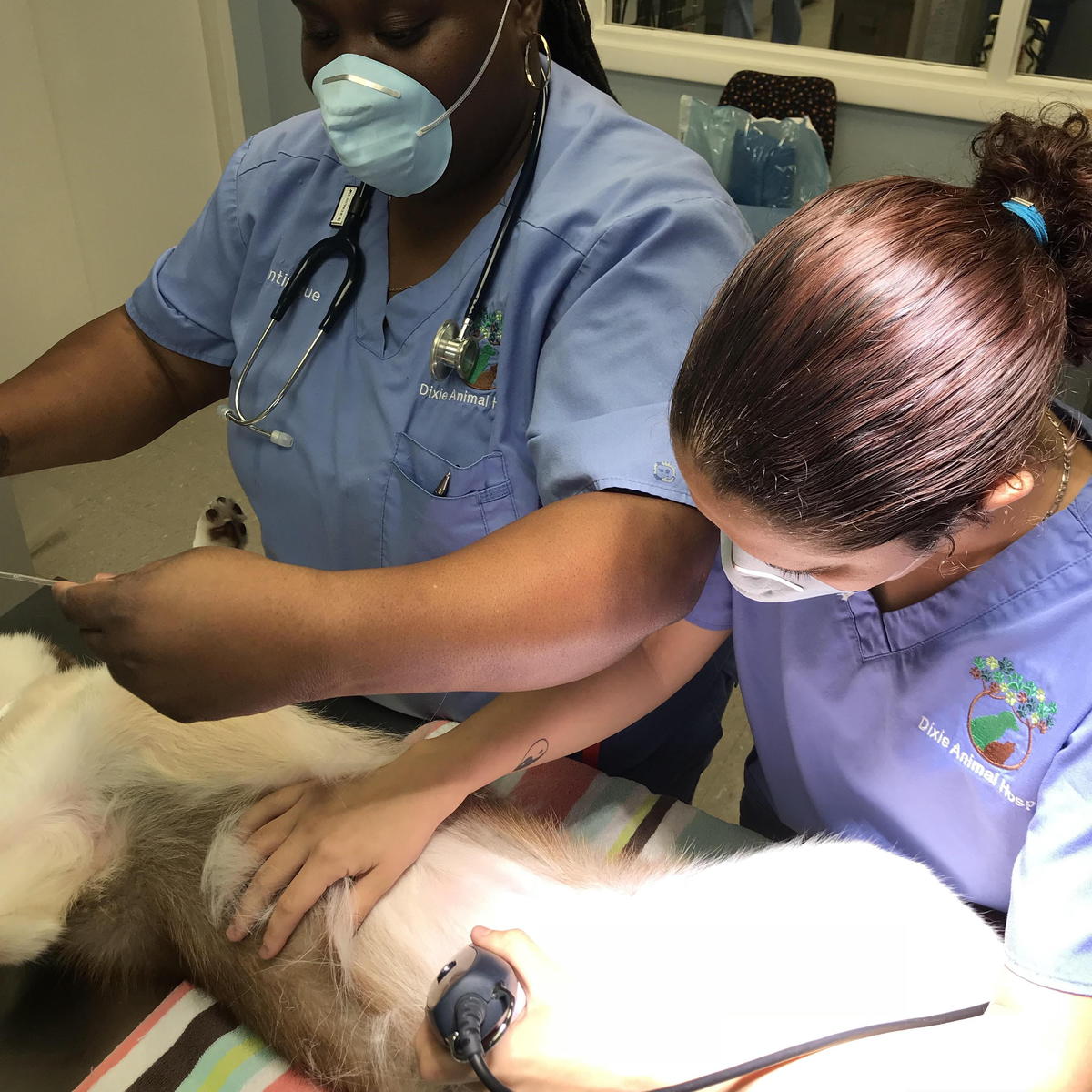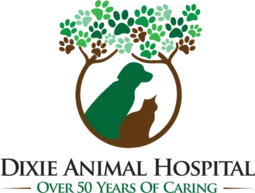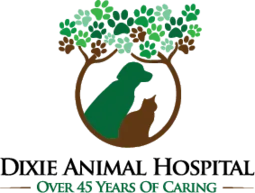A Vet Tech Series: Meet Antinique Chinn and Leanne Blanco
- posted: Oct. 16, 2018

From October 14th to October 20th we celebrate National Veterinary Technician Week. During this time we take a moment to highlight the behind-the-scenes work that our technicians and nurses perform on a daily basis. The theme of this year's Vet Tech Week is "Veterinary Nursing in Action". We have nine caring, compassionate technician and nurse staff who do the hard, dirty work that goes unnoticed each day. Join us as we highlight these excellent team members throughout the week.
We begin our series with Antinique Chinn and Leanne Blanco. Antinique has been with Dixie Animal Hospital since 2013 but has worked in the veterinary field for over 15 years. Leanne has been at Dixie Animal Hospital for just over one year but also has been working in the field for over 6 years. Their combined knowledge is an integral part of our learning system at Dixie Animal Hospital.
Why did you choose this field?
Antinique Chinn (AC): The veterinary field seemed like something different for me; something new. Since I've been in the field I've worked in a variety of areas from large volume settings like the Animal Services department with the county, to overnight emergency medicine, to small animal practice. I like the personal setting of small animal practice the most.
Leanne Blanco (LB): I always knew I wanted to work with animals, but I didn't know in what capacity. Was I going to choose medicine or was I going to advocate for animals from a legal perspective? Ultimately I went with the medical route as I find there is no better feeling than knowing that I am making sick animals feel better again.
What is a typical day for you like?
AC: I usually wake up around 5:30 AM and get ready for my hour commute to Dixie Animal Hospital. It's a far drive, but it's worth it for what I love. When I arrive I start by reading the administrative emails so that I can see if there is anything that needs immediate early morning attention. After that I check the schedule for surgery and dentistry preparations, before getting into the appointments for the day.
LB: We have to start our day by seeing what comes in as far as appointments, surgeries, (etc.). You have to prepare yourself the best you can for what sort of day to expect. Of course I need my coffee; it's the best way to jump-start my day. Throughout the day I am working on odds and ends, prepping patients, pulling blood, sending samples to the laboratory or running them in-house, and blood pressures. Typical daily duties.
No job comes without challenges. What is the most challenging aspect of your job?
AC: It gets tough watching a client have to choose between extensive healthcare for their pet or financial hardship. We want to be able to help every animal that walks through the doors, but not every case can be handled with the financial burden. It's definitely the most challenging aspect for me.
LB: The euthanasia experience is definitely the toughest. It's not only sad for the pet owners, but it's sad for the staff as well. These patients become our extended family over time, and while we have to maintain a professional outward appearance, we are layered with emotions on the inside. You never get used to the process, but we understand the necessity in the comfort of our patients.
What has become the most rewarding aspect of your job?
AC: I love the wonderful co-workers that I get to work with. Playing with animals, caring for them, loving them; it is all very rewarding. Interacting with the clients and comforting them when they need it most; all of these aspects make me go home feeling accomplished.
LB: I feel most rewarded when our patients are feeling better and when our clients let us know that they are feeling better. It's a great feeling knowing that the medicine we are practicing is working and setting our patients up for healthy futures.
What professional experience stands out among the rest for you?
AC: At the emergency clinic we had a new pet owner come in with his puppy that was extremely lethargic. We couldn't figure out what was going on with the puppy, but we knew something was definitely wrong. After some questions about what sort of medications and supplements the pet may be on, we found out that the owner used roach spray to "treat" the fleas on the puppy. It was a first for me, but fortunately, we had a great toxicity protocol and were able to get the puppy back in perfect shape, all while educating the client on proper preventative measures for fleas and ticks.
LB: I remember back in 2012, we had a patient that wouldn't eat. He was hospitalized for a week and we could not find anything to entice him. We were starting to get to the end of our options and the owner had begun preparing themselves for the Quality of Life discussion. One morning, we took the dog out for a walk and when we got back to the kennel area he dived under the cages for a piece of food. I mean he lunged! He was acting as if he was starved, and to a degree he was. We gave him some food options and he started devouring everything in sight. No treatment, no explanation, just got better on his own. It was definitely a little miracle and to this day that patient is doing wonderfully.
This is the first in a series of Dixie Animal Hospital technician/nurse profiles that will run throughout the week in celebration of National Veterinary Technician Week.
Location
Find us on the map
Dixie Animal Hospital
14701 S Dixie Hwy
Miami, FL 33176, US
Office Hours
Our Regular Schedule
8:00 am - 5:00 pm
8:00 am - 5:00 pm
8:00 am - 5:00 pm
8:00 am - 5:00 pm
8:00 am - 5:00 pm
8:00 am - 2:00 pm
Closed

